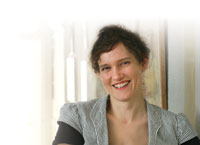Newsbites (page 2)
Breaking a million
About 70 McGill students recently raised more than $1-million for the University and they did it one phone call at a time.
The McGill Student Phonathon team places calls to about 60,000 McGill graduates every year. This is the first year that the phonathon cracked the million-dollar mark. McGill Annual Fund associate Sasha Bateman, who oversees the phonathon, says their approach to raising money eschews the hard sell. “We always tell the students that they’re acting as ambassadors for the University.”
Plenty of graduates are delighted to hear from current students, peppering them with requests and questions (Can you make sure the McGill News goes to my new address? Is Amelio’s Pizzeria still around?).
A few graduates are less than thrilled about receiving phone solicitations but, thanks to eight hours of rigorous training, the phonathon callers can easily handle the occasional prickly situation.
“We thicken their skin in training,” says Bateman. “We throw everything at them that they might encounter on the phone.”
Bateman believes her phonathon charges pick up invaluable tools. “They develop their communication skills and learn how to troubleshoot.”
There are more than a million reasons to conclude that they’re on the right track.
What Canada is reading
It wasn’t all that long ago that Heather O’Neill, BA’94, sold self-produced chapbooks of her writing for a buck a pop outside clubs and metro stations.
These days, copies of O’Neill’s first novel, Lullabies for Little Criminals, are flying off the shelves of bookstores across the country after the Montrealer’s improbable triumph in CBC Radio’s recent “Canada Reads” competition.

O’Neill was pitted against some topflight talents — critically acclaimed scribes like Timothy Taylor and fellow McGill grad David Bezmozgis, BA’96, and a revered national icon in Gabrielle Roy. Steep competition to be sure, and O’Neill’s chances for prevailing didn’t seem promising when journalist Denise Bombardier, a Canada Reads panelist, made no secret of the fact that she wasn’t much of a fan of Lullabies.
Musician John K. Samson was the panelist who championed O’Neill’s book, after chancing upon a galley copy of Lullabies before it was even published. His arguments won the day, with Lullabies edging out Taylor’s Stanley Park in the final vote.
In Lullabies, O’Neill creates a memorable heroine in soon-to-be-teenager Baby — terrifically bright, fuelled by a vibrant imagination and capable of arresting insights. “Childhood is the most valuable thing that’s taken away from you in life, if you think about it,” she notes at one point.
Baby is also naïvely cocky and dangerously vulnerable to the charms of a smooth-talking pimp. Her dad, while often well-meaning, is anything but father-of-the-year material as he wrestles with a heroin addiction.
O’Neill’s own youth mirrors Baby’s to a degree. Like her character, O’Neill grew up in some dodgy neighbourhoods, and her own parents’ approach to child-rearing could charitably be described as unconventional.
“Writers have always come from all sorts of strange places,” O’Neill says. “Literature reflects every part of human experience, every type of background. Writers are like witnesses.” Critics have hailed her authentic portrayal of Baby’s youthful point of view. “That’s something I worked on for years,” O’Neill explains. “I learned to stop thinking like an adult, in a weird way. I didn’t want [Baby’s] voice to be filtered through an adult perspective.” She says her professors at McGill — one in particular — helped nurture her development as a writer.
“The professors in the English department really encouraged us to be inventive, to take risks.” O’Neill recalls how one professor, Paul Piehler, praised an essay she wrote about William Blake, describing it as a “bird of parallel flight” to the famed English poet’s own work.
“I kept that note in my wallet for a long time. It made me want to keep on writing.”


